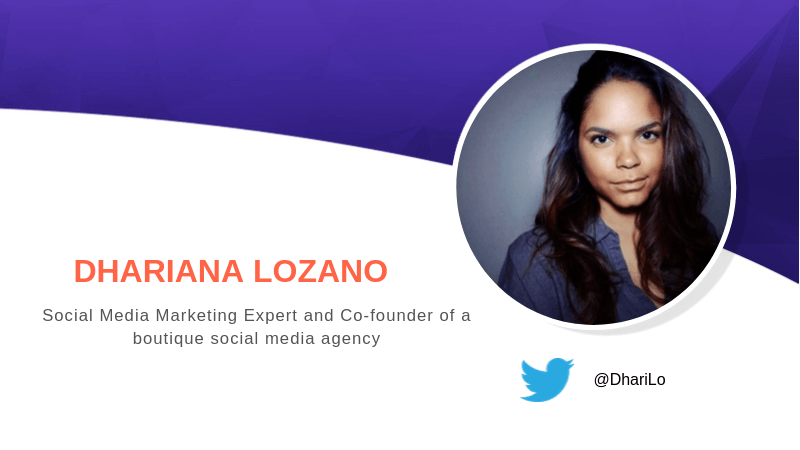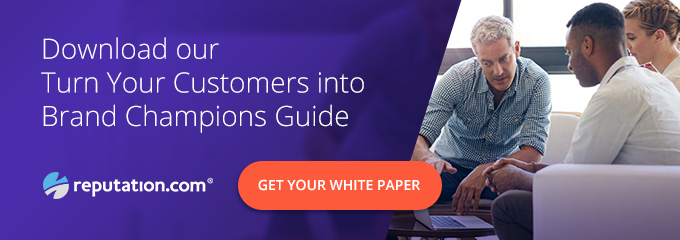Q&A with Dhariana Lozano: Social Media Marketing Expert Extraordinaire
Reputation Staff Writer


Dhariana Lozano is a social media marketing expert and co-founder of a boutique social media agency that shows clients how to get noticed in an ever-growing marketplace. She’s a digital marketing expert, blogger and speaker with more than 23,000 Twitter followers who wait impatiently for her next nugget of advice.
You’re a social media marketing expert. Do you find those who are new to the concept of social media don’t quite understand why you do what you do?
There are so many misconceptions about social media marketing! People think I just tweet and post pictures. But there’s so much more to it than that. It’s a little bit of science, a little bit of psychology, and a lot of trial and error.
Clients in more traditional industries sometimes don’t understand it. So I spend a lot of time educating them about what social media is, how to use it correctly, etc. People either don’t get it or they think it’s super simple.
How do you demonstrate to clients the value of social media marketing?
We like to look at web traffic.
Some clients don’t have analytics, but if they do, I always ask for access. We keep an eye on traffic to websites, landing pages and downloads. But we also look at engagement and growth on the individual social media networks we’re working on. We concentrate on impressions, reach, comments and shares.
Is tracking extra challenging with social media marketing data?
Tracking is always an issue in social media. People rarely see an ad, then click and buy right away.
If there’s a landing page, we like to ask people how they found us. We ask people in brick-and-mortar shops. Or we ask for discount codes that are specific to social media marketing.
In the hospitality industry, in particular, the wait for the reward can be longer. People don’t eat out or stay in hotels every night. What do you tell your clients?
You have to educate them. We have to explain that you will see a bump, but it probably won’t be right away. Social media doesn’t always directly link to sales.
Sometimes our clients will see more people come in the weekend we run an ad, but most of the time it’s not like that. And that can be frustrating on both sides.
It’s all about educating our clients, letting them know what to expect and managing those expectations.
Everybody wants more Twitter followers. What’s the secret to achieving high numbers?
Be consistent and tweet often. You can’t think tweeting once a week will get you huge results. That’s not how it works. People can tweet once or twice an hour if they want to. It’s a lot faster-paced than the other social networks. It works to your advantage because you can get more information out there.
Also, have a complete bio. Some people overlook the Twitter biography. Make sure that your links are correct and updated, and that you’re giving a nice snapshot of your business.
So tweeting often is important. But is it possible to tweet too much?
That depends on the individual account, but it’s something to keep an eye on. I like to test with my clients and even on my own account tweeting a little bit more, tweeting a little less and looking at the analytics. Twitter’s great about giving analytics. I check to see what’s working and what’s not. Did people drop off when I tweeted a lot? Am I getting more engagement if I’m tweeting more?
If marketing was a pie, how big should the social media slice be?
Even though I’m a social media person, I always advise my clients to build their email lists — because that’s your audience. You own that list; it’s yours.
As we’ve seen, Instagram, Facebook and Twitter can all go down, and then you’re stuck with nothing. I always suggest that you use social media to build up those email lists. Email is more of a direct way of communicating with your audience.
When it comes to the pie, that depends on each business and how they’re breaking up budgets, where their concentration is, what the market is like. Social media is so prominent now. When I hear about a business, the first thing I do is hop on Instagram or Facebook and see what they’re about. Social media is often used as a search engine. You could hop on Google, but you’re already on social media. So you should always have some sort of presence on there.
It’s like having a website. People will look you up, and you should be where your customers are.
Facebook has been alternatively outrageously popular and seemingly dead. What do you see for Facebook’s future?
I think it’s up and down. There are still a lot of opportunities. It gives you so many ways to segment your audience and dig deep into their interests, see what they’re engaging with. You can retarget people who have been on your website, so it’s more of a warm lead, an easier sell. And you can also retarget people who have engaged with your content or watched your videos.
If you have an audience, and you’ve been good about nurturing them and engaging with them, it’s a little easier than reaching new people.
Ads on social media are a process, because each ad gives you the opportunity to learn and hone in on what your audience responds to color-wise, imagery-wise and messaging-wise. You can do little tweaks and get better and better.
What if it’s a new business? Is getting on Facebook critical?
It’s getting more difficult to gain a following on there. It’s not impossible, but it is a little bit harder than Instagram or Twitter, where you can reap the benefits of hashtags.
The instant nature of social media necessarily means some posts will go up accidentally, or with errors or other embarrassing repercussions. How can businesses prevent that?
Reputation is such a big thing. On social media, so many people have opinions, and someone will be offended.
For reputation management, you have to be clear about who you are and what your brand is, and what values you stand behind. Have a plan in place and make everybody aware of it.
If someone tweets badly about your brand, you can get ahead of it, try to remediate the situation and take it offline before it snowballs out of control.
What about employees? Sometimes they take to social media and damage your brand. How can you prevent that?
It can impact your business, but there’s always a way to get ahead of it or respond to it.
When we work with a new business, we train the team on the correct way to talk about the business, the proper hashtags to use and how to engage with customers.
You just have to hope people don’t go on a rant. But if they do, you have to be prepared to respond.
It’s scary. But it’s the risk that comes with being out there.

